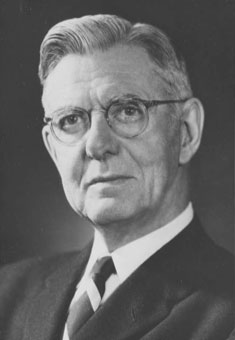
“Frank Doble was a true innovator who foresaw the potential of the electric power industry when it was still in its infancy,” says President Lawrence S. Bacow.
A Legacy of Innovation
Tufts receives $136 million, the largest gift in university history, from charitable trust established by Frank C. Doble, Class of 1911
An act of philanthropy by Boston technology pioneer and Tufts University alumnus Frank C. Doble more than 40 years ago has resulted in a gift of $136 million, the largest in Tufts' history. Doble's generosity will allow the university to begin development of an interdisciplinary laboratory that will advance research and collaboration in biology and engineering, while also supporting financial aid, faculty and other critical needs.
Doble, who earned a degree in electrical engineering from Tufts in 1911 and founded Doble Engineering Co. in 1920, passed away in 1969. His legacy included generous trusts that will now yield approximately $272 million, divided equally between Tufts and Lesley University. This represents the largest single act of philanthropy ever made to Tufts.
"Frank Doble was a true innovator who foresaw the potential of the electric power industry when it was still in its infancy. The technologies that he developed made the industry safer and more productive," said Tufts President Lawrence S. Bacow. "In founding Doble Engineering, Frank Doble pushed the boundaries of science and technology, just as our faculty and students do today. We are grateful that his legacy will help future generations to attend Tufts and enable us to create a new laboratory, named in his honor, to advance collaboration among our biologists and engineers."
The new integrated laboratory, planned for Tufts-owned property on Boston Avenue in Medford, will allow scientists from Tufts School of Engineering and the Department of Biology in the School of Arts and Sciences to pursue cooperative research while also providing the facilities needed for scholarship within the fields of engineering and biology.
"New laboratories are needed in order to recruit the best faculty and enable them to thrive at Tufts as teachers and scholars," said Tufts Provost and Senior Vice President Jamshed Bharucha. Tufts has not constructed a new laboratory building on the Medford/Somerville campus in almost 20 years. "A new facility will also provide expanded opportunities for our students to get involved in research. At Tufts, we believe that research and teaching go hand in hand, and some of the best education takes place in our research laboratories."
Putting biologists and engineers in the same building will also spark multidisciplinary collaboration. "The pace of development today is so rapid that inquiry should not be limited by department and school boundaries," said Bharucha. "The current collaboration among Tufts biologists and engineers to develop the first entirely soft-bodied robots is an excellent example of what can happen when faculty and students seek to cross those boundaries."
Tufts will work closely with the community during development of the new facility. If approved, it will be built on Tufts property at 550 and/or 574 Boston Ave., near the existing Science & Technology Center.
Ellenzweig Associates of Cambridge, Mass., has been retained for the detailed programming of the laboratory. The university expects to engage an architect in the next two months.
A Multi-Faceted Pioneer
Doble was the founder of Doble Engineering Co., a worldwide leader in providing high-end diagnostic test solutions for the electric utility industry. Doble's systems were designed to enhance the safety and reliability of power systems, and more than 95 percent of all the electricity generated in North America was "Doble Tested," according to the corporate history published in 1995 on the company's 75th anniversary.
Currently based in Watertown, Mass., the company leased its Medford, Mass., headquarters from Tufts from 1925 to 1947, and Doble and his enterprise were closely connected with the university for many years.
Doble was born in South Paris, Maine, in 1886, as the age of electricity was dawning. Westinghouse Electric Co. was founded in the same year, and General Electric emerged six years later. He graduated from Paris High School in 1903, then took additional classes at Methuen (Mass.) High School, where he explored two emerging industries-automobiles and power generation. He entered Tufts in 1907 and earned a bachelor's degree in electrical engineering in 1911. To finance his Tufts education, he installed, wired and rewired a new telephone system at the college.
Nine years after graduation, he founded Doble Engineering, with offices at 40 Central Street in Boston. The company was briefly located in Cambridge before moving to the Medford Hillside area of the Tufts campus in 1925, remaining there for 22 years. In August 1947, Doble Engineering relocated from Tufts to Belmont, Mass., but its founder maintained his connection with the university. Doble regularly invited Tufts engineering students to tour his plant and sought out Tufts graduates for his company. Tufts Professor Amos L. Dolbear, inventor of the condenser microphone; Alvin Howell, chair of Tufts' electrical engineering department; and Tufts Presidents Leonard Mead and Nils Y. Wessell were among those with whom Doble and his company maintained close relationships. A staunch supporter of education, Doble also developed close ties with Lesley University and its founder, Edith Lesley Wolfard.
In addition to engineering and education, Doble's passions included the works of William Shakespeare. In 1962, Tufts awarded Frank Doble an honorary doctor of science degree. Said the honorary degree citation: "Humanist and engineer, you have demonstrated in your career that it is possible to bridge the gap between two cultures; beyond this you have shown that the inevitable result of this bridging is responsible citizenship."
Doble died on December 30, 1969. He had generously named Tufts and Lesley in his estate plans in 1960. The two universities were the primary beneficiaries of two irrevocable trusts that together owned 87 percent of Doble Engineering. In November 2007, ESCO Technologies of St. Louis purchased Doble Engineering. The trusts have been dissolved and the assets distributed.


